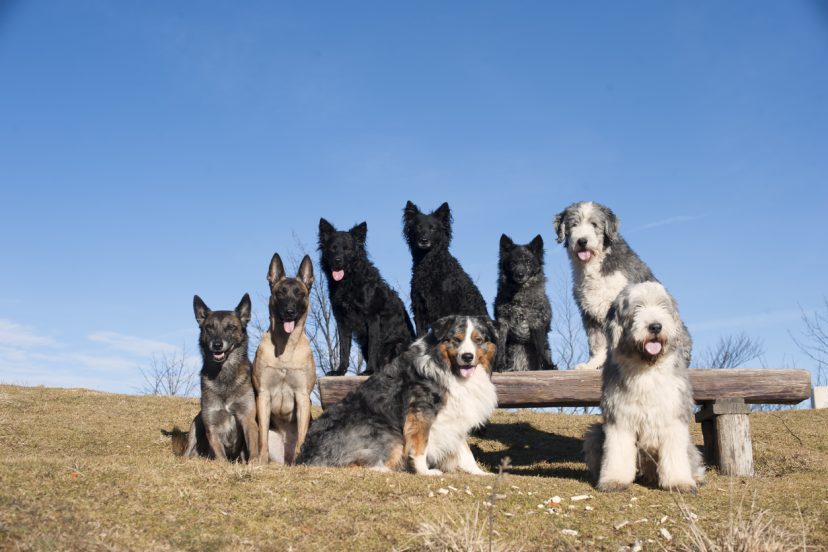Top 14 Healthy Dog Breeds for a Long Life
Post Disclaimer
We may earn a commission for purchases made using our links. Please see our Disclaimer to learn more.
Top 14 Healthy Dog Breeds for a Long Life
As a pet parent, choosing the right breed for your furry friend can be a daunting task. There are so many factors to consider, from size and temperament to exercise requirements and grooming needs. But have you ever thought about the health of the breed? Choosing a healthy dog breed can help ensure your furry companion lives long and happy. This blog will discuss what makes a dog breed ‘healthy,’ the factors determining their health, and the top 14 healthiest dog breeds. From the Australian Cattle Dog to the Old English Sheepdog, we will explore each breed’s unique qualities and what makes them an excellent choice for pet owners who prioritize their pet’s health. So, let’s dive in!
The Importance of Choosing a Healthy Dog Breed
Choosing a healthy dog breed minimizes health issues and reduces vet visits. Healthier breeds often have longer lifespans, ensuring more years of companionship. Opting for a healthy breed also lowers the risk of genetic diseases, promoting a happier and more active lifestyle for your pup. By selecting a healthy dog breed, you can prevent common health problems and provide your furry friend with a better quality of life. So, consider factors like breed history, genetics, and overall health when making this important decision.
What Makes a Dog Breed ‘Healthy’?
Healthy dog breeds are characterized by their superior health and fewer health conditions. Genetic factors play a significant role in determining a breed’s health, while environmental factors and the care provided also contribute. These factors help distinguish the healthiest breeds recognized by kennel clubs.
Factors Determining the Health of a Dog Breed
Genetic and environmental factors play significant roles in determining the health of a dog breed. A breed’s genetic makeup can predispose it to certain health conditions or diseases, while environmental factors such as living conditions can impact its overall well-being. The lifestyle and care provided to a dog breed, including proper nutrition and regular veterinary check-ups, are crucial for maintaining its health. Additionally, regular exercise is essential for keeping any dog breed in good physical shape. Lastly, the breeder’s quality can significantly influence a dog breed’s health.
Genetic Factors
Certain dog breeds have a higher propensity for genetic diseases and health conditions. It is crucial to consider genetic testing to identify potential health risks in specific breeds. Breeding practices play a significant role in shaping the prevalence of genetic diseases. Although popular, purebred dogs may be more susceptible to genetic health issues. Understanding a breed’s genetic history is vital when selecting a healthier dog. Considering these genetic factors, you can make an informed decision and choose a dog breed with a lower risk of inherited health problems.
Environmental Factors
Living conditions and the environment play a critical role in the health of dog breeds. Adequate shelter and protection are essential to prevent health problems in dogs. Exposure to toxins and pollutants can have a detrimental impact on a breed’s overall well-being. Additionally, climate and weather conditions can influence the health of a dog breed. By providing a clean and safe environment, we promote the overall well-being of the breed. Remember, a healthy living space is crucial for the long and vibrant lives of our beloved furry friends.
Lifestyle and Care Factors
Proper nutrition and a well-balanced diet play a crucial role in maintaining the healthiness of dog breeds. Regular exercise is essential for their physical and mental well-being. Veterinary care, including vaccinations and regular check-ups, is necessary to ensure their overall health. Grooming practices, such as regular brushing and bathing, can prevent potential health issues. Creating a loving and caring home environment positively impacts the health of dog breeds. By focusing on these lifestyle and care factors, you can contribute to the longevity and well-being of your furry friend.
Understanding the Healthiest Dog Breeds
The healthiest dog breeds, known for their overall well-being and vitality, often have longer lifespans and fewer health problems. Regular exercise is essential for these breeds to maintain their health. Genetic factors play a significant role in identifying healthy breeds, while athleticism and agility are characteristics of the healthiest dog breeds. Consider breeds like the Poodle, Havanese, and Pharaoh Hound known for their health and longevity. They require daily exercise to stay active and prevent issues like arthritis and kidney disease. These small-sized dogs originated from various countries, such as Cuba and the United States.
Breed 1: Australian Cattle Dog
Australian Cattle Dogs are renowned for their robust health and exceptional endurance. Compared to many other dog breeds, they have a longer average lifespan. These dogs thrive on regular exercise to maintain their overall well-being. Fortunately, this breed is relatively free from common health issues. However, it is crucial to schedule routine check-ups with a veterinarian to ensure their continued good health. The Australian Cattle Dog’s exceptional health makes them an excellent choice for active individuals or families seeking a long-lived and healthy four-legged companion.
Breed 2: Beagle
Beagles, known for their sturdy build and relatively few health problems, are generally considered one of the healthier dog breeds. With an average lifespan of 12-15 years, beagles require regular exercise to prevent obesity and related health issues. Regular grooming and dental care are important for their overall well-being. As part of the NLP terms, it’s worth mentioning that beagles are a hound breed, originating from the United States. They have been popularized in pop culture as well, just like the poodle, another breed from the U.S.
Breed 3: Border Collie
Border Collies are renowned for their robust health and exceptional athleticism. This breed tends to have a longer average lifespan compared to many other breeds, making them an excellent choice for dog owners seeking a long-term companion. To ensure their well-being, regular exercise, and mental stimulation are crucial for Border Collies. It’s important to note that they may be prone to certain genetic health conditions. Therefore, providing a nutritious diet and regular veterinary care is essential for maintaining their overall health and longevity.
Breed 4: Shiba Inu
Shiba Inus are renowned for their longevity and overall health. These dogs require regular exercise to stay fit and healthy. With a low prevalence of genetic diseases, Shiba Inus have a life expectancy of 12 to 15 years, making them a long-lived breed. Additionally, they are generally free from major health issues. Overall, Shiba Inus are a healthy and robust breed that can bring joy and companionship to any household.
Breed 5: German Shorthaired Pointer
German Shorthaired Pointers are highly energetic dogs that thrive on regular exercise. When properly cared for, these dogs can enjoy a long and healthy life. However, they are prone to certain health issues such as hip dysplasia and progressive retinal atrophy. This is why regular vet check-ups are important to detect any potential health problems early on. German Shorthaired Pointers are known for their athleticism and agility, making them an excellent choice for active individuals or families.
Breed 6: Belgian Malinois
Belgian Malinois, a healthy and robust breed, requires regular exercise to maintain their physical and mental fitness. With a life expectancy of 14 to 16 years, they are known for their endurance and vitality. However, like other breeds, Belgian Malinois can be prone to health conditions such as hip dysplasia and elbow dysplasia. To ensure their well-being, regular veterinary care is crucial. By providing adequate exercise and consistent healthcare, you can help your Belgian Malinois lead a healthy and fulfilling life.
Breed 7: American Foxhound

American Foxhounds are known for their overall good health and minimal genetic diseases, making them a generally healthy breed. To ensure their well-being, regular exercise is crucial for these energetic hounds. With a life expectancy of 10 to 12 years, American Foxhounds may be prone to certain health issues, such as patellar luxation. Therefore, proper nutrition and regular vet check-ups are essential in maintaining their health. By following these steps, owners can help their American Foxhounds live a long and healthy life.
Breed 8: Bichon Frise
Bichon Frises are known for their good health and long lifespan. Regular grooming and dental care are crucial for maintaining their well-being. This small breed is generally free from major health issues, making them a popular choice among dog owners. With a life expectancy of 12 to 15 years, Bichon Frises can be a loyal and healthy companion for many years. Just like any other dog, they require regular exercise to stay fit and happy.
Breed 9: Siberian Husky
Siberian Huskies, known for their striking appearance and energetic nature, are generally a healthy breed with few health issues. To keep them in optimal condition, regular exercise is crucial for their physical and mental well-being. With a life expectancy of 12 to 14 years, Siberian Huskies may be prone to some health conditions, such as hip dysplasia and eye problems. Hence, regular vet check-ups are important to ensure their overall health and catch any potential issues early on. Embracing a proactive approach to their well-being ensures that Siberian Huskies lead happy and healthy lives.
Breed 10: Australian Shepherd
Australian Shepherds are known for their robust health and longevity. With a life expectancy of 13 to 15 years, these dogs are considered one of the healthiest breeds. However, like any other breed, Australian Shepherds may be prone to certain health issues, such as hip dysplasia and epilepsy. It is important to provide regular exercise to keep them physically and mentally fit. Additionally, regular vet check-ups and vaccinations are essential for their overall well-being. By taking proper care and ensuring their health needs are met, Australian Shepherds can enjoy a long and healthy life.
Breed 11: Greyhound
Greyhounds are known for being a generally healthy breed, with few genetic diseases to worry about. However, it’s important to provide them with regular exercise to maintain their health and fitness. With a life expectancy of 10 to 14 years, Greyhounds require proper care to ensure their well-being. While they may be prone to certain health conditions like bloat and dental issues, regular vet check-ups and a balanced diet can help mitigate these risks. By taking these precautions, you can help your Greyhound lead a long and healthy life.
Breed 12: Basenji
Basenjis are known to be generally healthy dogs with a life expectancy of 12 to 14 years. Regular exercise is crucial for keeping Basenjis physically and mentally stimulated. While they are a healthy breed, Basenjis may be prone to certain health conditions such as Fanconi syndrome and progressive retinal atrophy. Therefore, regular vet check-ups and proper nutrition are vital for their overall well-being. By following these guidelines, Basenjis can enjoy a long and healthy life.
Breed 13: Chihuahua
Chihuahuas, although small in size, are generally a healthy breed known for their long lifespan. Regular exercise and a well-balanced diet are essential for maintaining their overall health. With a life expectancy of 12 to 20 years, Chihuahuas require regular vet check-ups and dental care to prevent dental problems and patellar luxation. Despite their small stature, they are prone to some health issues. However, with proper care, Chihuahuas can lead a healthy and happy life.
Breed 14: Old English Sheepdog
The Old English Sheepdog, with its iconic shaggy coat and friendly nature, is a breed that is generally healthy and has few genetic health issues. With an average lifespan of 10-12 years, these dogs are known for their longevity. Regular exercise is vital for maintaining their overall health and well-being. When provided with proper care and nutrition, Old English Sheepdogs can enjoy a long and healthy life. Their presence in a family brings joy and companionship.
What are the Benefits of Choosing a Healthy Dog Breed?
Choosing a healthy dog breed comes with numerous benefits. Not only does it reduce the risk of costly vet bills and health issues, but it also ensures a longer lifespan for your furry friend. Additionally, healthy dog breeds tend to be more energetic, promoting an active lifestyle for both pet and owner. By opting for a healthy breed, you can minimize the chances of genetic diseases and hereditary health conditions.
Conclusion
Choosing a healthy dog breed is crucial for the well-being and longevity of your furry friend. Not only do these breeds tend to have fewer health issues, but they also have a better quality of life overall. From the energetic Australian Cattle Dog to the friendly Beagle and the intelligent Border Collie, there are several options to choose from. These breeds are known for their resilience and adaptability, making them great companions for an active and fulfilling lifestyle. By selecting a healthy dog breed, you are ensuring that your canine companion will have a long and happy life by your side. So, consider these top 14 healthy dog breeds when looking to bring a new four-legged family member into your home.


















